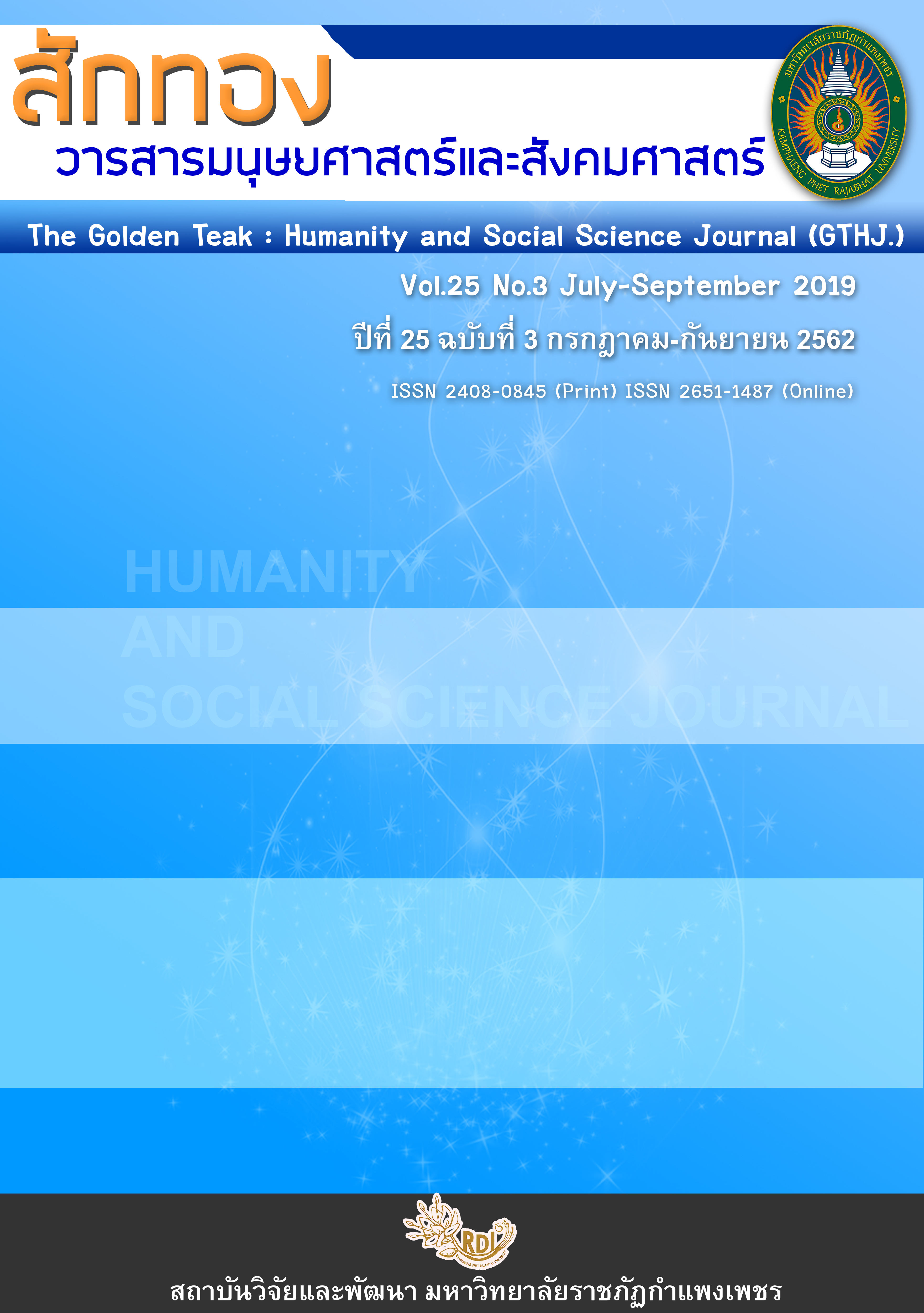The Development of Indicators of the 21st Century Learning for Rajahbat Universities
Main Article Content
Abstract
The purposes of this research were to 1. develop the indicators of the 21st century learning for Rajabhat Universities and 2. perform a confirmatory factor analysis of indicators of the 21st century learning for Rajabhat Universities on hypothesis model with empirical data. The sample consisted of two groups comprised, 12 experts were selected by purposive sampling, 420 teachers in Faculty of Education, Rajabhat Universities comprised, 90 teachers in three northern Rajabhat Universities, 120 teachers in four northeastern Rajabhat Universities, 150 teachers in five central Rajabhat Universities, and 60 teachers in two southern Rajabhat Universities, were selected by stratified random sampling technique. The questionnaires of indicators of the 21st century learning for Rajabhat Universities were used for data collection. (r = 0.98). Data were analyzed by confirmatory factor analysis using LISREL version 8.72.
The results of the research were as following : 1) Regarding the analysis of exploratory factor, it indicated that the 21st century learning composed of 5 factors with 52 indicators namely curriculum development (12 indicators), instructional management (9 indicators), student development (12 indicators), teacher development (11 indicators), and administration and management (8 indicators). 2) The results of confirmatory factor analysis of model in the indicators of the 21st century learning for Rajabhat Universities were found that 52 indicators, each indicators were positive and at statistical significance level of .01. Arranged 5 factors from the highest factor loading value to the lowest, they were from 0.86 to 0.97 respectively: instructional management, student development, teacher development, curriculum development, administration and management which the factors were 0.97, 0.97, 0.93, 0.92 and 0.86 respectively. The construct validity of models was consistent with empirical data, with chi-square goodness of fit test at 539.11 with 688 degrees of freedom; p-value = 1.00, Goodness of Fit Index (GFI) = 0.95, Adjusted Goodness of Fit Index (AGFI) = 0.90, Standardized Root Mean Square Residual (SRMR) = 0.03, and Root Mean Square Error of Approximation (RMSEA) = 0.00
Article Details
บทความที่ได้รับการตีพิมพ์เป็นลิขสิทธิ์ของวารสาร สักทอง : วารสารมนุษยศาสตร์และสังคมศาสตร์ สถาบันวิจัยและพัฒนา มหาวิทยาลับราชภัฏกำแพงเพชร
ข้อคิดเห็นใดๆ ที่ปรากฎในวารสารเป็นวรรณกรรมของผู้เขียนโดยเฉพาะ ซึ่งมหาวิทยาลัยราชภัฏกำแพงเพชรและบรรณาธิการไม่จำเป็นต้องเห็นด้วย
References
6th National Learner Development. [Online]. Available :
http://www.moe.go.th/mobile1/viewNews.php?nCatId=news_act&moe_mod_news_ID
=46900. [2016, December 2015].
Koonkaew, A. (2012). The Development of Higher Education Achievement Indicators as
ASEAN Community Member. Phetchabun : Faculty of Education, Phetchabun
Rajabhat University.
Koonkaew, A. (2014). The Development of New Generation Teachers’ Characteristics.
Phetchabun : Faculty of Education, Phetchabun Rajabhat University.
Office of the Education Council. (2017). The National Education Plan, A.D.2017-2036.
Bangkok : Prig wan Co., Ltd.
Pakdeejit, Y. (2017). Active Learning and the 21th Century Skills. [Online]. Available :
http://apr.nsru.ac.th/Act.../27022015155130_article.docx. [2017, March 26].
Panich, V. & Srisodapol, M. (2016). Readiness of Thai Higher Education Institutions
towards ASEAN Community in 2015. [Online]. Available :
http://rt-spark.blogspot.com/2010/12/2558.html. [2016, March 8].
Suebjit, L. (2013). The development of indicators for teachers competency in the 21st century
office of the basic education commission. Journal of Education Khon Kaen
University (Graduate Studies Research), 8(4), 142-149.
Sunatda, K. (2016). The 21st Century Learning. [Online]. Available : http://kannikasunatda.
blogspot.com/2017/04/21_8.html. [2016, September 12].
The Office for National Education Standards and Quality Assessment (Public Organization).
(2010). Mannual : the 3rd External Quality Assurance (A.D.2011-2015) for Higher Education. (2 rd ed.). Bangkok : Offset Plus Co., Ltd.
The Partnership for 21st Century Skills. (2009). Learning for the 21st Century. [Online].
Available : http://www.p21.org/storage/documents/P21_Report.pdf. [2009, July 3].
The Secretariat of the Cabinet. (2016). The Annual Performance Report of the Prime
Minister, General Prayut Chan-o-cha on (September 12th, 2014-September
12th, 2015). [Online]. Available : http://www.soc.go.th/acrobat/payut_report1_11.pdf.
[2016, May 2].


